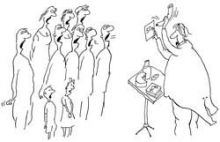Minister of Labor and Social Policy Mykhailo Papiiev recently publicized an interesting fact. Up to 90 percent of the benefits conferred on the electorate by governments and MPs date to election campaigns. In other words, such ideas may often have been socially unwarranted, and accordingly, denied financial implementation.
Now that another campaign is going full blast, politicians are trying to outdo each other in demonstrating jealous care of their respective electorates. Traditionally, the topic of benefits and social support for childbirth is especially popular. President Yushchenko’s increase of the one-time childbirth allowance must have played a role, and a baby boom has started in Ukraine. However, this is largely due to the existence of a disadvantaged population, since even the president’s 8,000 hryvnias cannot provide for a child’s upkeep and education.
Political opponents mention a variety of sums, as if competing on a highest-bidder basis. Yulia Tymoshenko’s bloc promises 10,400 hryvnias for the first childbirth, 15,000 for the second one, and 25,000 for the third. Even in collaboration with the People’s Self- Defense, Our Ukraine didn’t dare promise more than 12,000, 15,000, and 25,000 for the first, second, and third childbirths. The Party of Regions, said to be made up of Ukraine’s wealthiest citizens, promises to splurge 11,700 for the first childbirth, but it regards the second one as a veritable achievement (25,000) and will pay 50,000 hryvnias for every subsequent child.
During this parliamentary campaign none of the candidates have made the kind of mistake President Yushchenko did when he signed the edict considerably increasing the childbirth allowance, except that children of up to three years of age, born before the signing of the edict, would still be receiving a miserable 90-100 hryvnias a month. The Regionals promise 100 hryvnias a month for every child aged 3-13, and 200 hryvnias for those aged 13-18. Our Ukrainians and People’s Defenders are more generous: 235 hryvnias for every child under 6, and 298 between the ages of 6 and 18 (this must have taken some computation!). So our kids will have enough to buy a few pencils and a glass of beer.
The communists’ promises are the most modest, although their fantasies have not gone further than money, either. They would also increase the amount of the childbirth allowance: 18,400 hryvnias for the second and subsequent childbirths (why not 18,300 or 18,500?). However, since the communists are in a financially tight situation — they are not in power, are they? — they are promising to lower the retirement age by five years for one of the parents (which one?).
Large amounts of money lull the conscience as effectively as lullabies put children to sleep. This reminds me of the words of President Kuchma, who even wrote a book about the fact that “Ukraine is not Russia.” In Russia, they are already paying amounts of childbirth allowance (although not immediately), which are supposed to be enough for the offspring and his education.
Neither is Ukraine like Slovakia, which I visited 28 years ago. At the time it was a small socialist republic, part of Czechoslovakia. The Slovaks had also tried to improve the demographic situation with money. There were various kinds of government assistance, which strike us as exotic even today: husbands were given paid leave after the birth of a child and an allowance so that they could pay for meals at the office canteen (their wives were in the maternity hospital and there was no one to cook their meals). Parents also received compensation for children’s clothing and footwear (until the child turned 18), and part of the rent (in the case of a co-op apartment) was written off with each subsequent childbirth.
Most importantly, they built so many apartment houses for young families that several nine-story buildings were standing empty for about a year in a small town near Kosice, where my girl friend lived. They were co-op projects and the tenants had to pay rent. People were not willing to move in because they knew that after a certain waiting period they would receive free government-subsidized apartments.
The Czechs and Slovaks, however, made the same mistakes our politicians are making during this campaign. They also increased the allowance for every child born, but when a baby boom started among local gypsies and asocial elements began using childbirth allowances to live well, without spending any money on their children, the authorities changed their tactic: no allowance increase after the third childbirth. The Czechoslovak government made promises, but it also counted its money.








